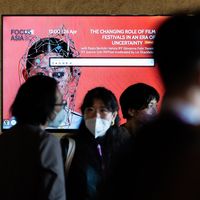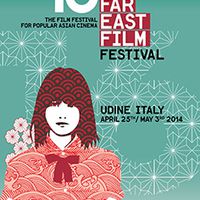Udine Far East Filmfest turns 14

 After fourteen editions, a successful Festival stops being an event and transforms into something more. More than a bet that has been won, more than a promise that has been kept. A dimension happily shared by those that create it and those who live it…
After fourteen editions, a successful Festival stops being an event and transforms into something more. More than a bet that has been won, more than a promise that has been kept. A dimension happily shared by those that create it and those who live it…Emotions, energy, participation: Far East Film, the great festival dedicated to Asian cinema, is ready to blow the candles out on its fourteenth birthday cake! A truly anticipated calendar event, from 20th to 28th April in Udine, a dimension that has by now transcended the single cinematographic vision and is spreading from the big screen to everything that revolves around it.
It is enough to think about the production sector (the fourth edition of the workshop Ties That Bind will hold its first part from 22nd to 26th April in Udine – and its second part from 8th to 11th October in Busan, South Korea – uniting 5 Asian producers and 5 European producers with the objective of making a film in coproduction between the two continents), or the fact that from 17th January, the name Far East Film will become the trademark for a new home video series created by the collaboration between the very Friulan Tucker Film and CG Home Video (the first two titles to be released are Ip Man by Wilson Yip and the legendary A Hero Never Dies by Johnnie To, both celebrated at the Festival but unpublished on the market).
Then, we must not forget about television and distribution. Thanks to Carlo Freccero, numerous Far East Film titles have found a prime time space on Rai 4: the collection is entitled Missione Oriente and it goes without saying that the series is doing extremely well! In addition to TV we have another collaboration between Tucker Film and the Festival, which will see on 8th March (International Women’s Day), on the silver screens across Italy, an authentic treasure from art house films Made in Asia: the very moving A Simple Life, from Hong Kong director Ann Hui, already in competition at the Venice International Film Festival where it won the Coppa Volpi for best performance by a female actor.
And there we have it, the Far East Dimension. A few brief tasters from the upcoming 2012 edition, consisting of over sixty films. European and International Premieres gathered together in a vast selection drawn from the best catalogues inHong Kong,
China,Japan,South Korea,Thailand,Malaysia,Indonesia,Philippines,SingaporeandTaiwan. Entering the Teatro Nuovo “Giovanni da Udine”, with its 1,200 seats (which are always packed) or the Visionario, will therefore be like entering a cinema in Seoul, Tokyo or Manila, to enjoy the very same films that the people actually living in those great cities go to see every day. We’re also taking a full immersion into the very much anticipated return of the Cosplay Contest, taking place on Sunday 22nd April in the centre of Udine, a fashion show of costumes, clothes, and make-up inspired by the shapes and forms of the protagonists from the worlds of manga, anime, comics, cinema, TV series, music and videogames, all with pan-Asian origins.
Udine, however, will not only be giving its attention to contemporary Asia but will also be looking at its past, through the study of 10 films unseen in the West, from one of the darkest periods (yet culturally one of the richest) in the history of South Korea: the Seventies. Entitled The Darkest Decade: Korean Filmmakers in the 1970s, this valuable retrospective, authored by Darcy Paquet, will show us how despite the difficult political and social environment, equally repressive and characterized by ferocious censorship, and notwithstanding the careers of several talented directors being abruptly suspended (Lee Jang-ho was arrested in 1975 for using marijuana, and banned from making films until the assassination of President Park Chung Hee; Shin Sang-ok had his license to make films revoked by the government in 1975, and was subsequently kidnapped and taken to North Korea), several directors managed to remain active throughout the 1970s, and produced some of their most memorable works in this period.
The Darkest Decade is a celebration of their achievements, and an opportunity to tell, for the first time outside the confines of South Korea, the story of their struggles. And this too is Far East Film!
(from the site)
Similar content
from - to
19 Apr 2013 - 27 Apr 2013
posted on
16 Feb 2023
from - to
29 Apr 2014 - 03 May 2014
from - to
25 Apr 2014 - 03 May 2014
posted on
12 Jun 2011
from - to
23 Apr 2015 - 02 May 2015




